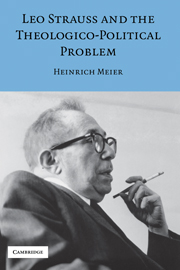Book contents
- Frontmatter
- Contents
- Preface to the American Edition
- I THE THEOLOGICO-POLITICAL PROBLEM: ON THE THEME OF LEO STRAUSS
- II THE HISTORY OF PHILOSOPHY AND THE INTENTION OF THE PHILOSOPHER: REFLECTIONS ON LEO STRAUSS
- III WHAT IS POLITICAL THEOLOGY?
- IV WHY POLITICAL PHILOSOPHY?
- APPENDIX: TWO UNPUBLISHED LECTURES BY LEO STRAUSS
- Index of Names
IV - WHY POLITICAL PHILOSOPHY?
Published online by Cambridge University Press: 05 March 2013
- Frontmatter
- Contents
- Preface to the American Edition
- I THE THEOLOGICO-POLITICAL PROBLEM: ON THE THEME OF LEO STRAUSS
- II THE HISTORY OF PHILOSOPHY AND THE INTENTION OF THE PHILOSOPHER: REFLECTIONS ON LEO STRAUSS
- III WHAT IS POLITICAL THEOLOGY?
- IV WHY POLITICAL PHILOSOPHY?
- APPENDIX: TWO UNPUBLISHED LECTURES BY LEO STRAUSS
- Index of Names
Summary
We all know the picture of the philosopher that Aristophanes drew in the Clouds for both philosophers and nonphilosophers. As he is shown to us in this most famous and thought-worthy of comedies, the philosopher, consumed by a burning thirst for knowledge, lives for inquiry alone. In choosing his objects, he allows himself neither to be led by patriotic motives or social interests nor to be determined by the distinctions between good and evil, beautiful and ugly, useful and harmful. Religious prohibitions frighten him as little as do the power of the majority or the ridicule of the uncomprehending. His attention is fixed on questions of the philosophy of nature and of language, in particular, on those of cosmology, biology, and logic. By the keenness of his mental powers, the intransigence of his scientific manner, and the superiority of his power of discourse, he casts a spell on his pupils and gains co-workers, who assist him in his zoological experiments, astronomical and meteorological observations, or geometrical measurements. His self-control and endurance enable him to withstand every deprivation that results from carrying out his scientific projects. By contrast, he lacks moderation. Piety and justice do not count among the qualities on which his reputation is based. Authority and tradition mean nothing to him. In making his innovations, he no more takes into consideration what is time honored than in his teaching he takes account of the vital needs of the society on whose fringes he places himself along with his friends and pupils.
- Type
- Chapter
- Information
- Leo Strauss and the Theologico-Political Problem , pp. 89 - 112Publisher: Cambridge University PressPrint publication year: 2006



